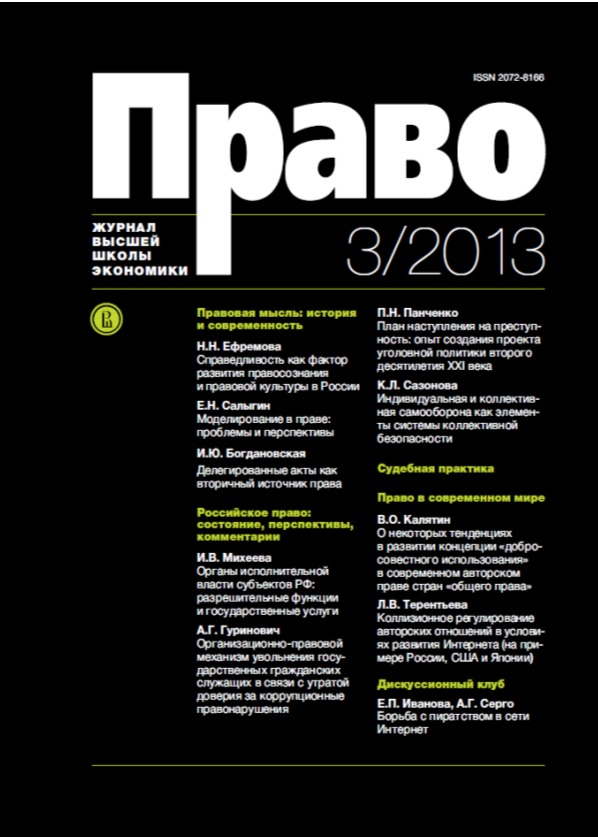Delegated Acts as Secondary Sources of Law
Abstract
For comparative law studies sources of law are of special interest. They are taken into account when classifying national legal systems. Delegated legislation as a source of law in common law countries has a number of features characterizing this system. Though the source is known to all common law countries, it has a number of differences. The article reveals a special character of delegated laws and their role in contemporary law. The role of statutory law including the proportion of delegated acts is increasing currently in the legal family of common law based on case precedent. The legal doctrine differentiates primary sources of law (cases and statutes) which historically do not depend on other sources and secondary sources including delegated acts. The conception of delegating powers and delegated laws differs in the common law countries. From this position, parliaments have unlimited lawmaking authorities which may be delegated to other state bodies. Other countries have accepted this doctrine to the extent to which they recognize the principle of parliamentary rule and separation of powers. The system of sources has been evolving gradually within legal family. Nowadays, statutes and delegated acts belong to statutory law which being the written law counterbalances the unwritten one (case law). Despite the statutes have a significant legal force, delegated acts influence them. The development of skeleton, framework legislation contributes to strengthening the positions of the delegated legislation. The secondary nature of delegated acts is confirmed with various forms of control (legislative, executive and judicial). The control is being administered to adopt delegated acts within their powers (intra vires).
References
Bromhead P. Evolutsiya britanskoy konstitutsii [Britain's developing constitution]. Moscow, 1978.
Jenks A. Angliiskoe pravo [English law]. Moscow, 1947.
Atiyah P.S., Summers R.S. Form and Substance in Anglo-American Law.
Barber N.W., Young A.L. The Rise of Prospective Henry VIII Clause and Their Implications for Sovereignty // Public Law. 2003. Spring.
Beatson J. The Scope of Judicial Review for Error of Law // Oxford Journal of Legal Studies. Vol. 4. 1984. DOI: https://doi.org/10.1093/ojls/4.1.22
Bennion F. Statute Law. L., 1980.
Cross R., Harris J.W. Precedent in English Law. Oxford, 1991. DOI: https://doi.org/10.1093/oso/9780198761624.001.0001
De Smith. Judicial Review of Administrative Action. L., 1980.
Dicey A. Introduction to the Study of the Law of the Constitution. 8th. 1915. repr. Indianapolis, 1982.
Epstein R. Simple Rules for a Complex World. Cambridge, 1995. DOI: https://doi.org/10.4159/9780674036567
Farnsworth E.A. An Introduction to the Legal System of the United States. N.Y., 1996.
Joseph P.A. Constitutional and Administrative Law in New Zealand. Sydney, 2001.
Harlow C., Rawling R. Law and Administration. L.-Harmondsworth, 1984.
Garner J. Administrative Law. L., 1974.
Marshaw J., Merrill R., Shane P. Administrative Law. St. Paul. 1998.
Page E. Governing By Numbers. Oxford, 2001.
Pearce D.C. Delegated Legislation in Australia and New Zealand. Sydney, 1977.
Schwarts B., Wade W. Legal Control of Government. Administrative Law in Britain and US. Oxford, 1972.
Whalan D.J. Scrutiny of Delegated Legislation by the Australian Senate // Statute Law Review. Vol. 12. 1991. DOI: https://doi.org/10.1093/slr/12.2.87
Copyright (c) 2013 Law Journal of the Higher School of Economics

This work is licensed under a Creative Commons Attribution-ShareAlike 4.0 International License.


















